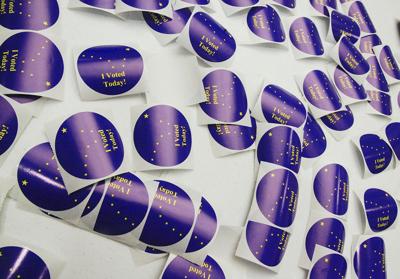Legislation addressing youth voter preregistration, election processes and purging voter rolls is making its way through the Alaska Legislature.
Companion bills House Bill 246 and Senate Bill 232 would allow people between the ages of 16 and 18 to preregister to vote. Under current Alaska statute, people can register to vote any time within 90 days of their 18th birthday.
According to Sen. Scott, Kawasaki, the bill’s sponsor in the Senate, the youth voter preregistration bill encourages young people to become engaged in learning about government and the elections process.
Rep. Maxine Dibert (D-Fairbanks), cosponsor of the House’s version of the bill, said that it is important to get young people civically engaged so that they make their voice heard through voting as an adult.
Kawasaki said that voter registration and encouraging young people to be civically engaged is a bipartisan topic.
Ellen Weiser, board president of Kids Voting North Alaska, said that Kids Voting aims to provide educated voters and that she supports the bill because it incentivizes students to take civics education seriously.
“As citizens of this country they have rights and responsibilities, and if one of those responsibilities is to vote it’s also their responsibility to become educated voters,” Weiser said.
SB 138 would change rules for determining the residence of voters, count absentee ballots before election day, implement an online ballot tracking system, establish a procedure for curing uncounted ballots, provide postage-paid return envelops and implement a signature verification system “in order to increase transparency and ensure trust in the integrity of the state’s vote counting and tabulation process and to allow members of the public to verify the accuracy of ranked-choice tabulations,” the bill states.
The bill would cost approximately $342 million to implement, according to a fiscal note.
Kawasaki said that making sure people have access to polling places and that voter rolls are accurate has been a priority for the bipartisan Senate Majority.
“Elections matter and elections do have consequences,” Kawasaki said. “We want to make sure the public has faith in our election process and anybody who is legally allowed to vote has the ability to vote, whether they live in rural Alaska and don’t have a polling place close by or whether they’re serving in the military overseas.”
More than 7,500 ballots were rejected in the U.S. House special primary in 2022, according to the Alaska Division of Elections. The first statewide by-mail election saw ballots rejected due to a lack of witness signature, they were handed in after the deadline, and others didn’t have a numerical identifier.
Alaska does not currently have a process for notifying voters that there was a problem with their ballot and allowing voters to fix it in time for their ballot to be counted.
Sue Sherif, co-president of League of Women Voters of the Tanana Valley, said, that after the 2022 special election, “We felt very strongly that there should be a ballot curing process” so if a voter “makes an honest mistake” they are notified and have the opportunity to correct their ballot.
According to the National Conference of State Legislatures, approximately two-thirds of state require election officials to notify voters when there is a missing signature or a signature discrepancy and provide them an opportunity to correct it.
Sheif said that if people have the opportunity to correct mistakes that they make at a polling location, such as signing your name in the wrong spot, providing the wrong ID, or spoiling a ballot, they should be able to correct those mistakes on mail-in ballots as well.
The League of Women Voters of the Tanana Valley also supports implementing a signature verification process and providing postage for absentee ballots.
Sherif said that the League of Women Voters of the Tanana Valley wants to make sure that people are confident in the election processes and that their vote will count.
“At the basic level if people don’t trust the process of their votes being counted or gathered then they may not trust the outcome of the election,” Sherif said, adding “Our whole goal is for all citizens is to be able to vote and to vote with confidence.”
The contents of Senate Bill 138 will be added to House Bill 129, according to Kawasaki. However, the Legislature has less than three weeks for both the Senate and House to approve the changes.
HB 129, which would update how the Division of Elections maintains voter registration rolls, passed the House 33-6 in February.
House Bill 129 would require the director of the Division of Elections to issue a notice by mail or email to voters who have not voted in two years requesting that they confirm or correct their address. The voter’s registration will be deactivated within 45 days after the notice is sent if the voter does not respond.
The division would also regularly review and update the master registry for data breaches, the number of registered voters compared to the number of people eligible to vote, names of deceased voters, people not qualified to vote, and people registered to vote in another state.
As of Jan. 3, 602,514 people are registered to vote in Alaska, according to the Division of Elections, while the Department of Labor and Workforce Development estimates that there are 560,111 people in Alaska of voting age.
According to the National Conference of State Legislatures, maintaining current and accurate voter rolls protects against fraud, informs Election Day planning, minimizes wait times at the polls, and reduces the number of provisional ballots cast.
Other election bills regarding voter roll maintenance, adopting additional ballot security provisions, creating an election offense hotline, expanding the crime of unlawful interference with an election and releasing unofficial election results before results are certified have not been heard in months.
Contact Haley Lehman by email at hlehman@newsminer.com.

